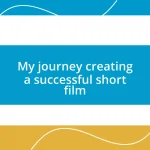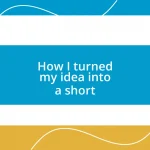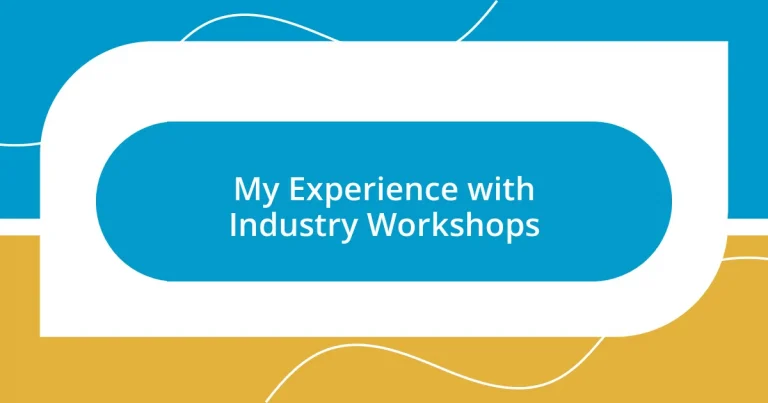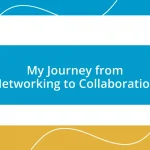Key takeaways:
- Workshops bridge the gap between theory and practice, igniting passion and sparking connections that can influence career trajectories.
- Effective networking at workshops fosters genuine relationships, leading to mentorships, collaborations, and enhanced opportunities in one’s career.
- Continuous improvement is a key outcome of workshops, where hands-on experiences and reflection help embed learnings and encourage lifelong development.
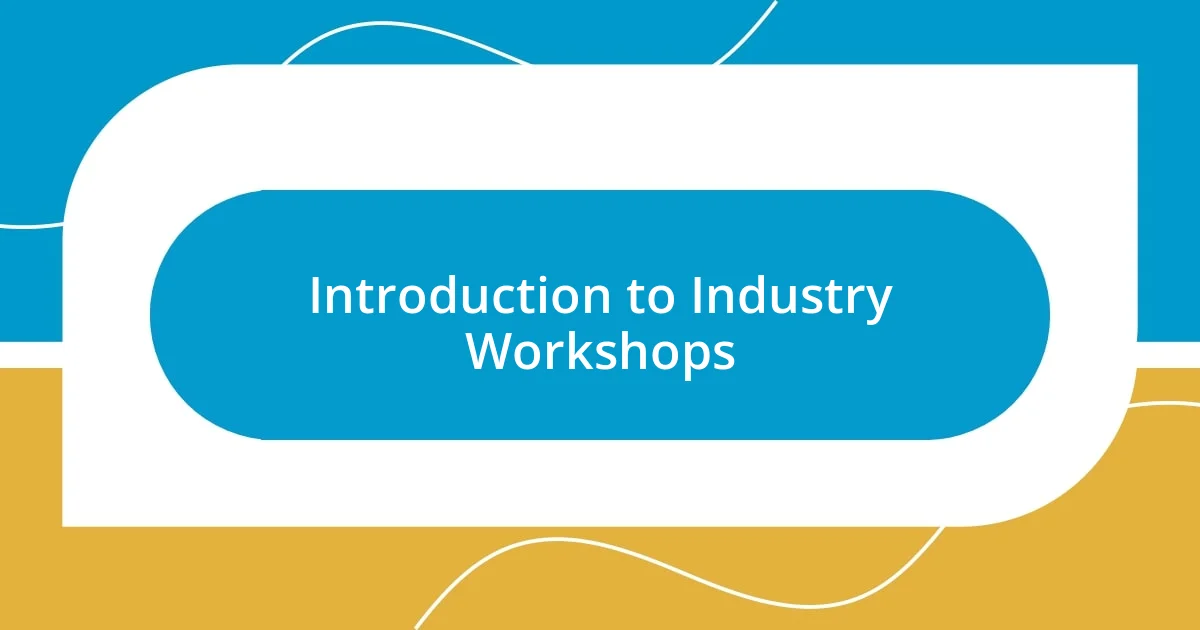
Introduction to Industry Workshops
Industry workshops are fantastic opportunities for professionals to engage with current trends, hone skills, and network with others in their field. I remember my first workshop vividly; I was both excited and anxious, wondering if I would actually fit in among seasoned experts. That feeling of stepping into a room filled with passionate individuals was both intimidating and invigorating—it made me realize just how valuable these gatherings can be.
These workshops often serve as a bridge between theoretical knowledge and practical application. I once participated in a hands-on session where I directly applied what I learned in my studies. The thrill of creating something tangible, alongside industry leaders, really sparked my curiosity and passion for my field. Have you ever felt that spark when learning something new? It’s an unforgettable feeling that workshops can ignite.
Moreover, the conversations and connections that stem from these events are priceless. I’ve forged friendships and mentorships that have significantly influenced my career trajectory. Thinking back, every meaningful relationship I built during a workshop opened new doors and led to unexpected opportunities. It’s magical how a single day can change your professional outlook so profoundly!
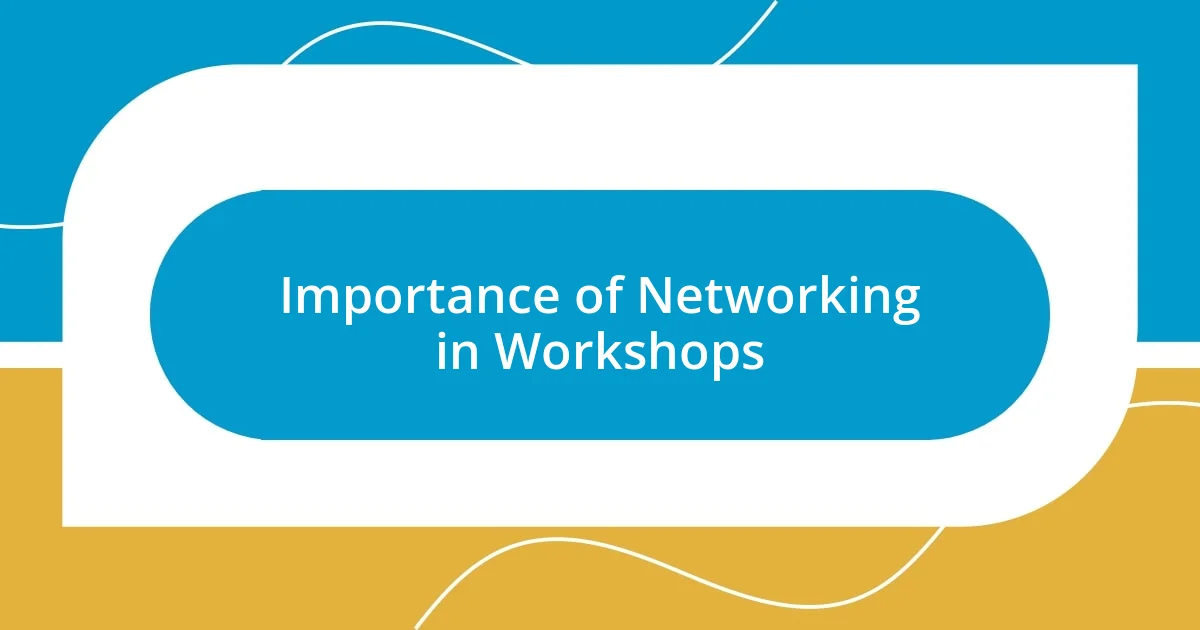
Importance of Networking in Workshops
Networking is an essential aspect of workshops, often overshadowed by the learning experiences themselves. I recall a specific workshop where I met a mentor whose guidance has shaped my career. Connecting with someone from a different part of the industry opened my eyes to new perspectives and opportunities I never considered before. Have you ever realized that a simple conversation can lead to a transformative relationship?
The power of networking isn’t just about exchanging business cards; it’s about forming genuine connections that can lead to collaboration and growth. During another workshop, I chatted with a fellow participant who later became my collaborator on a project that won an industry award. That experience taught me the importance of investing time in these relationships. Each person you meet can bring unique insights and open pathways you didn’t know existed.
In my journey, I’ve learned that workshops are much more than skill-building. They’re platforms to expand your circle and deepen your understanding of the industry landscape. I still keep in touch with many of the contacts I made, and those relationships continue to bear fruit in my career. It’s fascinating how one event can ripple out into an expansive network that enriches not just work life, but personal growth too.
| Networking Benefits | Personal Experiences |
|---|---|
| Connect with industry leaders | Mentorship that shaped my career |
| Collaborate on projects | Winning an award through a workshop connection |
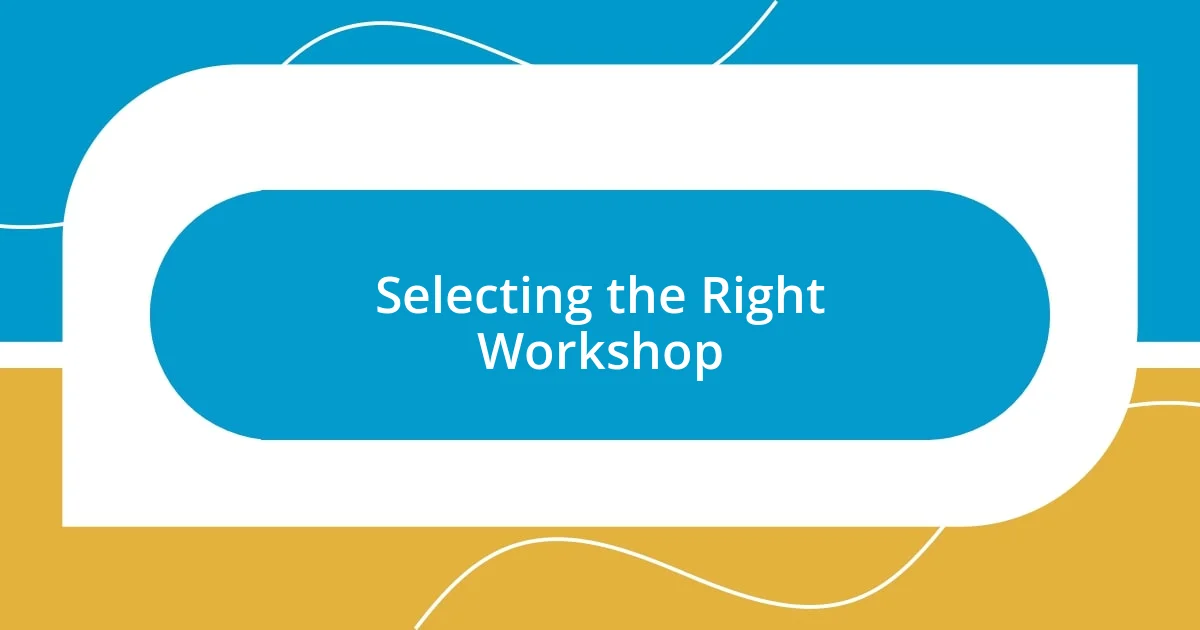
Selecting the Right Workshop
When it comes to selecting the right workshop, it’s essential to consider your goals and interests carefully. I remember feeling overwhelmed by the options during my first search. To narrow it down, I focused on workshops that aligned with my career aspirations and provided opportunities for hands-on learning. That clarity made all the difference.
Here’s a simple checklist that can guide you:
- Identify your objectives: What skills do you want to improve or acquire?
- Research presenters: Are they respected in their field? Do they have experience?
- Consider the format: Does the workshop include activities that match your learning style?
- Check reviews: What have previous attendees said about their experiences?
- Balance location and accessibility: In-person or virtual—what suits your situation best?
By keeping these factors in mind, I’ve attended workshops that truly resonated with me, enhancing both my skill set and confidence. Each selection has driven my passion even further, reinforcing why thoughtful choices are crucial in this journey.
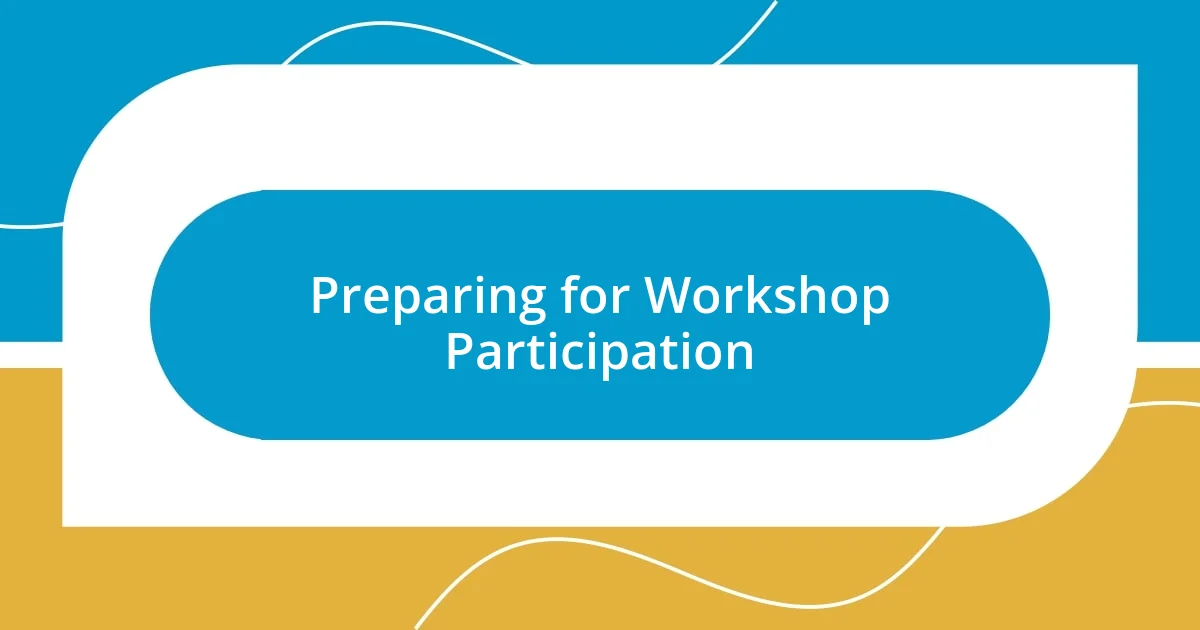
Preparing for Workshop Participation
Preparing for workshop participation involves a few key steps that can significantly enhance your experience. I vividly recall an instance where I didn’t prepare adequately and ended up feeling lost during the sessions. Reflecting on that, I realized it’s vital to familiarize yourself with the workshop agenda beforehand. By reading up on topics and understanding the objectives, you can engage more meaningfully. What could be more frustrating than attending but feeling unprepared to contribute?
Another helpful tip is to connect with other participants or facilitators before the workshop starts. I once reached out to a few attendees via social media, and it transformed my experience. We exchanged thoughts on the topics, which made it easier to dive into discussions when the workshop began. It’s amazing how a little pre-event interaction can break the ice and foster a supportive learning environment.
Don’t forget to pack a notebook and your favorite writing tools! On one particularly memorable occasion, I brought along colorful pens that motivated me to take comprehensive notes. Those notes became my go-to resource for applying what I learned later. Preparing mentally and physically for a workshop can set the tone for a productive experience. What methods do you use to prepare? Each small effort adds up to a rewarding participation journey.
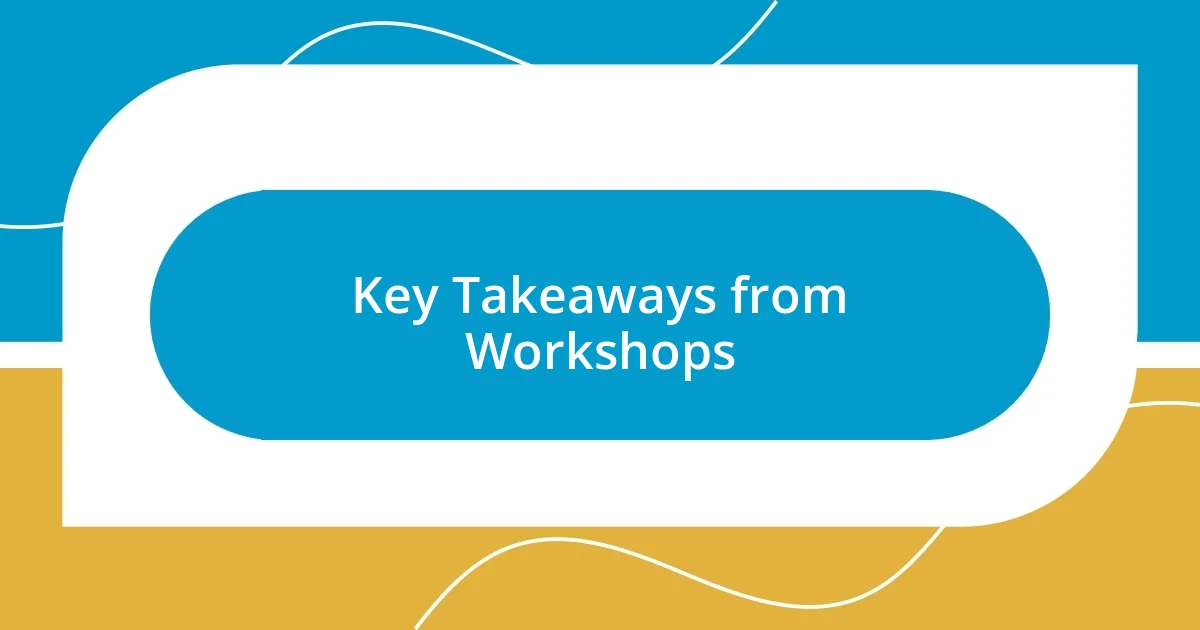
Key Takeaways from Workshops
One of the most impactful takeaways from attending workshops is the power of networking. I vividly recall a workshop where I didn’t think much about connecting with fellow participants. However, I ended up having a conversation with an industry professional, and that serendipitous chat opened doors I never anticipated. The connections you form can lead to collaborations, mentorships, and even job opportunities, all of which can significantly enhance your career trajectory. Isn’t it amazing how a simple interaction can blossom into something so beneficial?
Another eye-opener for me was the importance of real-world application. I remember sitting in a session where we split into groups to tackle case studies. This hands-on experience solidified my understanding of theoretical concepts like nothing else could. It made me realize that workshops often provide a unique environment to bridge the gap between knowledge and practical skills. Have you ever found that practicing what you learn in real-time can lead to those “aha” moments?
Lastly, workshops taught me the value of feedback, both giving and receiving. At one workshop, we participated in peer reviews, which initially felt daunting. However, receiving constructive criticism helped refine my approach to projects. It created a culture of growth and learning that I found invigorating. Reflecting on this, I’ve come to appreciate how essential feedback is for personal and professional development. Doesn’t it feel rewarding to grow with the help of others?
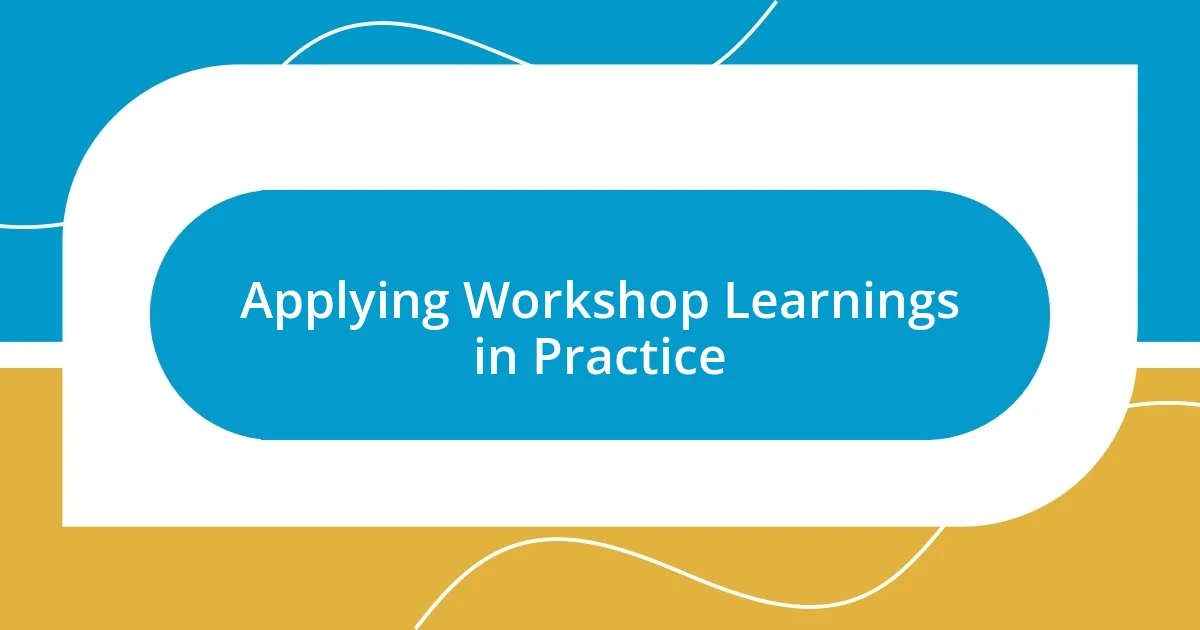
Applying Workshop Learnings in Practice
When it comes to applying what I’ve learned from workshops, I find that the first step is often the hardest—taking action. After one particular workshop on digital marketing strategies, I felt so inspired that I rushed back to my office and implemented a few techniques right away. The thrill of seeing immediate results was intoxicating, and it reinforced the idea that application should follow quickly after learning. Have you ever felt that rush of adrenaline when putting new skills into practice?
I also discovered the value of reflection in the application process. A few months after another workshop focused on leadership development, I carved out time to review my notes and think about how I had applied those insights. I realized that one of the strategies suggested was to hold weekly team check-ins. Implementing that simple change transformed my team’s communication and morale. It struck me that intentional reflection is key to truly embedding workshop learnings into our regular routines—what strategies do you use to ensure those lessons stick?
Lastly, sharing what I’ve learned with others has been incredibly rewarding. There was a moment when I decided to host a small lunch-and-learn session at work after returning from a workshop on conflict resolution. Seeing my colleagues engage and react to the concepts lit a fire within me. Their participation not only deepened my understanding but also created a collaborative atmosphere that echoed the workshop’s spirit. Isn’t it fascinating how teaching others can reinforce our own learning?
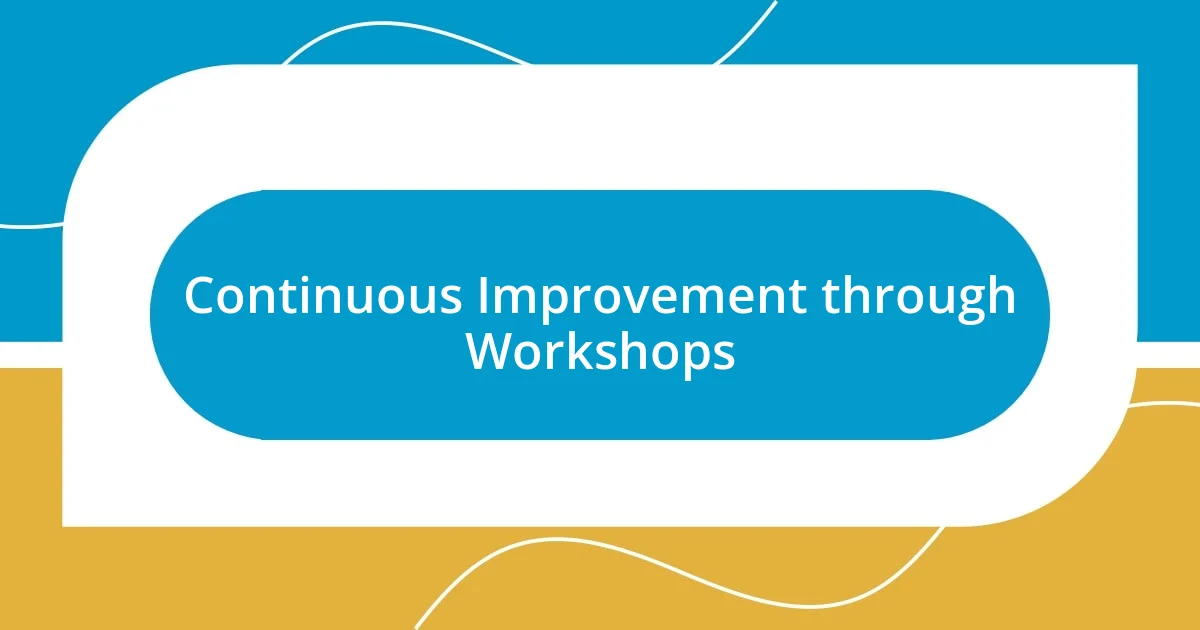
Continuous Improvement through Workshops
While attending workshops, I quickly learned that continuous improvement is often a collaborative effort. I remember one particularly engaging workshop on problem-solving techniques, where we tackled industry challenges in real time. The diverse perspectives from different participants sparked innovative ideas I hadn’t considered before, demonstrating how collective knowledge can drive improvement. Have you ever experienced that “light bulb” moment when the group dynamics unveil new solutions?
Another relevant experience was during a workshop focused on agile methodologies. I found myself immersed in activities that forced us to iterate on our ideas quickly. This hands-on approach ingrained the concept of continuous improvement in my mind. It wasn’t just about learning the theory; it was about experiencing the rapid feedback loop firsthand. Isn’t it exhilarating to see how adjusting your approach in response to immediate feedback can foster growth?
Most importantly, workshops encourage us to embrace a mindset of lifelong learning. After a session on personal development techniques, I confidently set measurable goals for myself. I revisited these goals regularly, tracking my progress and celebrating even the smallest wins. This approach reminded me that continuous improvement isn’t a destination; it’s a journey we embark on with every new skill or insight gained from a workshop. How do you incorporate continuous improvement into your life?







